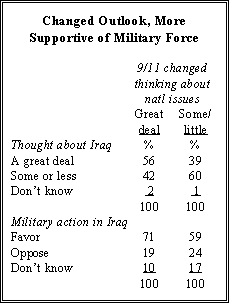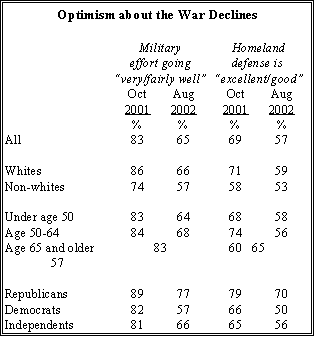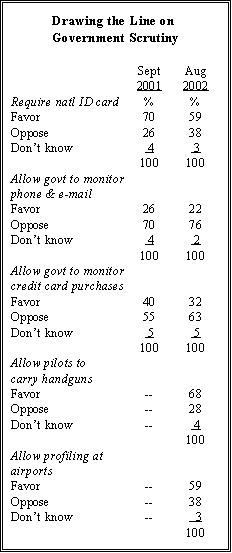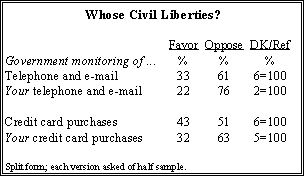Aside from the emotional toll taken by the attacks, Sept. 11 also had a significant impact on the way Americans think about politics and national affairs. Nearly half (46%) said that the attacks changed their own thinking about politics and national issues “a great deal,” while 30% reported “some” change. Only 21% said their thinking had been affected “not much” or “not at all.”

Among those who say they look differently at politics and policy, there is no consensus as to how their views have changed. The most frequently mentioned change is that people are now paying more attention to public affairs and world events.(1)
And people whose thinking on politics has been changed by Sept. 11 do take a different approach to some issues, especially questions involving the use of military force. Two-thirds of this group (68%) say it is very important that the U.S. take military action against countries developing weapons of mass destruction. A majority (56%) say they have thought “a great deal” about whether the U.S. should attack Iraq, and 71% favor military action.
By contrast, those who say their views have not changed much as a result of the attacks have thought less about the prospect of military action against Iraq. Just four-in-ten in this group (39%) say they have given the issue a great deal of thought. They also are less likely to support the use of force to remove Saddam Hussein from power.
Slow Progress in War on Terrorism

Nearly two-thirds of the public (65%) still say that the military effort to destroy terrorist groups is going at least “fairly well,” a solid majority but down from 89% in January. While nearly four-in-ten thought the war was going “very well” in January, only about one-fifth (22%) now feel this way.
Similarly, just 15% say the war in Afghanistan has been a success; about the same number who say it has been a failure. The vast majority 70% say that it is too early to tell.
A majority of the public (57%) also give the government a favorable rating (excellent or good) in defending Americans at home from future terrorist attacks. But this number also has been gradually declining since last October, when 69% of the public rated the government’s job performance in this area as good or excellent.
Confidence in the government’s efforts to combat terrorism both at home and abroad has slipped more among Democrats than Republicans. Just half of Democrats have favorable view of the government’s homeland defense efforts, down from 66% last October. While 82% of Democrats gave the military campaign positive marks in October, just 57% do so today. Among Republicans, there has been considerably less slippage.
The public is divided on the question of whether terrorists are better able or less able to launch another major attack on the U.S. About a third (34%) believe they are less able, but more than a fifth (22%) think they are more able. A plurality of 39% think the threat is unchanged. Not surprisingly, people who are very worried about another attack are much more likely than others to think the terrorists are stronger today: half of this group (49%) think the ability of the terrorists to strike has grown.
Few See Themselves As Possible Victims
A majority of the public remains at least somewhat worried about another terrorist attack on the United States. More than six-in-ten say they are very (16%) or somewhat (46%) worried about a future attack. Yet significantly fewer Americans believe that they or their families will become victims of terrorism. Just 12% say they are very worried about becoming a victim, and 28% are somewhat worried.
Levels of national and personal concern have remained relatively stable since last fall, although news of the alleged “dirty bomb” plot increased national concern in June. Nationally, parents with children living in the home mothers in particular are more likely than others to worry about becoming a victim of terrorism. Among people under 50 years of age, 54% of mothers are at least somewhat worried, compared with 35% of women without children. Similarly, 46% of fathers are worried, compared with 32% of non-fathers.
Chemical, Biological Attack Most Likely
A majority of Americans (54%) believe that if there is another attack, it will be committed by Islamic terrorists already in this country. Just 18% expect the perpetrators to be Islamic terrorists from abroad. And relatively few (9%) expect an attack engineered by non-Islamic terrorists like Timothy McVeigh.
When presented with several scenarios for a possible attack, 40% feel a chemical or biological weapon is most likely. A quarter (26%) think a suicide bomb attack in a restaurant, bus or other public place is most likely, and 8% think a nuclear weapon would be used. Just 5% think another attack with an airplane would be the chosen method for an attack.
The proposed cabinet-level Department of Homeland Security has not yet had much of an impact on the public, except for those in the Washington area, the location of the agency. Nationally, roughly half (52%) say they have heard or read something about the new department, but that figure rises to 70% in Washington. Among those aware of the idea nationwide, a large majority (76%) support it, with only 15% opposed. In Washington, 14% of those who are aware of the proposal say they or someone in their household would be directly affected by it.
Less Support for Intrusive Measures
Even as worries about future terrorism persist, public support for potentially intrusive government measures to deal with the threat at home has decreased. Support for requiring all citizens to carry a national identity card has declined from 70% in September to 59% today.

Similarly, shortly after the attacks last September, 40% favored allowing the government to “monitor your credit card purchases”; now 32% favor this. And the percentage in favor of allowing the government to “monitor your personal telephone calls and e-mails” declined a little (from 26% to 22%) over the same period. Decreases in support are seen among nearly all demographic groups, especially among women, those age 65 and older and people who have not attended college.
Anti-terrorism steps that do not involve greater government scrutiny of private activities garner significantly more support. A solid majority (68%) supports the idea of allowing airline pilots to carry handguns, and 59% favor allowing airport personnel to do extra checks on passengers who appear to be of Middle Eastern descent.
People who are worried about a new terrorist attack give much more support to nearly all of these measures than do those who are less concerned. For example, 70% of those who are very worried about another attack support the idea of ethnic profiling at airports; by contrast, only about half (49%) of those who are not too worried or not at all worried favor this measure.

Public support for some of these anti-terrorism measures is affected by whether the idea is targeted at unspecified individuals (allowing the government to monitor personal calls) or at the individual survey respondent (allowing the government to monitor your personal calls). Targeting calls and e-mails in general is favored by 33%; targeting “your” calls and e-mails is favored by only 22%. Similarly, monitoring credit card purchases in general is supported by 43%; monitoring “your” purchases is supported by only 32%. But support for a system of national identity cards is not affected by whether the idea is posed for “all citizens” or for “you.”
1. A sample of those who said their views had been affected were asked to explain in their own words how their thinking had changed.




